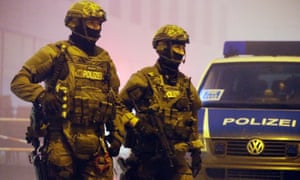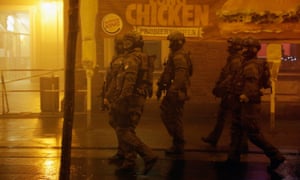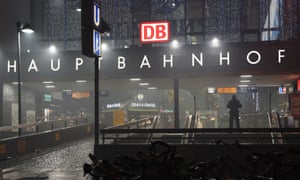German authorities receive foreign intelligence tipoff warning that up to seven suicide bombers would attack two of the city’s train stations

Police in Munich are hunting Islamic State suspects after a foreign intelligence agency warned of a “concrete” plan to send suicide bombers to the city’s train stations during New Year’s Eve celebrations.
Five to seven people were reportedly planning suicide bomb attacks on the main Hauptbahnhof station and Pasing station at the western end of the city centre, in what German authorities said was a “serious, imminent threat”, prompting them to evacuate the sites and warn people to stay away.
About 550 officers have been deployed to secure the city and no arrests had yet been made, said Munich police president Hubertus Andrä.
“We still have many colleagues deployed. There is, as before, a high threat of terror,” a police spokesman said.
The Bavarian interior minister, Joachim Herrmann, told a media conference on Thursday night: “The threat was very concretely centred on midnight and at these two places.” He added that all necessary security measures were being taken.
Citing anonymous security sources, Bavarian state broadcaster BR reported that Germany had received warnings from both US and French intelligence agencies earlier in the day. According to the intelligence, seven Iraqis living in Munich were named as the potential attackers, and they were planning to enter the stations in pairs and blow themselves up simultaneously.
Munich police spokeswoman Elizabeth Matzinger could not confirm the nationalities or the suspected residence of the suspects, or whether a manhunt for identified individuals was underway.
“Investigations are happening, but I cannot give out any details, that is a tactical information,” she told the Guardian. “I can’t confirm whether they are Iraqis, but it was apparently a group of five to seven people affiliated to IS [Isis].”
About 550 officers were on duty around the city, Matzinger added.
The two stations were shut down and evacuated around midnight, while special unit police officers armed with automatic weapons were stationed at entrances.
Munich police issued a statement saying that an attack was expected in the city during the night, and warned people to avoid the two stations and large crowds in general. But by 4 am, the situation appeared to have calmed significantly, and the two stations were re-opened.
“The closures at the main station and the Pasing station have been lifted, but there selective controls are being carried out there,” Matzinger said. “The situation after midnight is more relaxed than it was before midnight, but notwithstanding that we cannot give the all clear. We had a terrorist warning from the French secret service and we are still taking it seriously, because we can’t rule out that it is not serious – and as long as there is still the danger of a grain of truth to it, we will continue our measures.”
At the media conference, Herrmann said the intelligence had not been 100% reliable, but serious enough that it could not be ignored.
He compared the assessment of the danger to that in Hanover on 17 November, when an international friendly football was called off and the stadium evacuated at short notice. There too, a foreign intelligence tip-off had led to the alert, but no arrests were made and no explosives found in the stadium.

“The concrete tip-off came from one source,” Andrä said, before adding that there was no indication yet the threats could be confirmed or that any suspects had been arrested.
However, a spokesman for the police also said there would be a reinforced police presence in Munich city centre in the coming days. The police force was also bolstered in and around the Brandenburg Gate in Berlin, where huge New Year’s celebrations were being happening. All large bags and backpacks were banned from the site of the huge street party.
Despite the Munich police warnings to stay away from big crowds, thousands of people were on the streets of Munich at midnight to welcome the new year with fireworks.
DPA reported massive delays in the city’s public transportation system after both train stations were quickly evacuated and trains no longer stopped there.
The latest development comes amid ongoing security operations across Europe. Police in Belgium detained six people during house searches in Brussels on Thursday in an investigation into an alleged plot to carry out an attack in the city.

Earlier in the week, two other people were arrested on suspicion of preparing attacks on “emblematic sites” in Brussels during the celebrations. Another man was questioned over links to last month’s Paris attacks.
Authorities in the Belgian capital said a fireworks display and festivities that attracted 100,000 people in 2014 would not go ahead after revealing the alleged jihadi plot.
“Unfortunately we have been forced to cancel the fireworks and all that was planned for tomorrow [Thursday] evening,” the mayor, Yvan Mayeur, told Belgian broadcaster RTBF. “It’s better not to take any risks.”
In Paris, where 130 people were killed in December, the annual fireworks display on the Champs Élysées was called off and 11,000 police, soldiers and firefighters patrolled the French capital. More than 100,000 police were deployed across the country, according to the interior minister, Bernard Cazeneuve.
Red Square in Moscow, traditionally a place where people gather to ring in the new year, was closed. “It’s no secret that Moscow is one of the choice targets for terrorists,” the city’s mayor, Sergei Sobyanin, said recently.
New York City said it had its tightest ever New Year’s Eve security to protect an estimated 1 million revellers.
